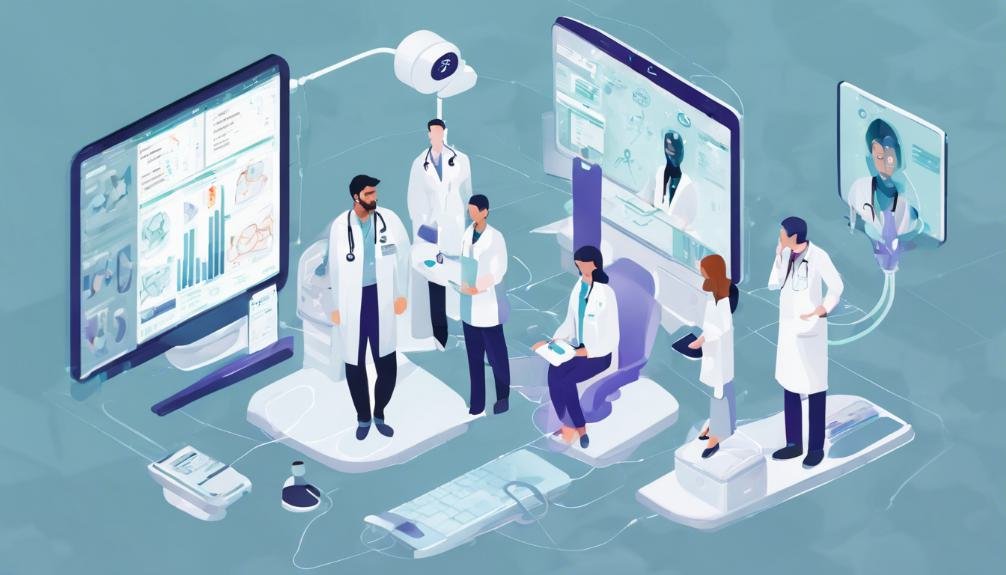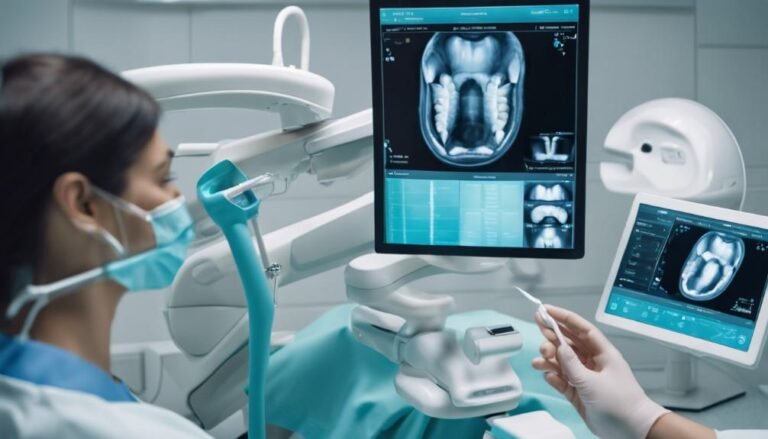AI in Health Information Systems
In the field of healthcare, the integration of AI in Health Information Systems has opened up a world of possibilities, shaping the future of patient care and medical practices. Imagine a system that not only stores data but also interprets it, providing insights that can revolutionize treatment approaches. As you ponder the implications of AI in healthcare, consider the ethical implications and potential societal impact of this technological advancement.
Key Takeaways
- AI enhances decision-making and diagnosis accuracy in healthcare systems.
- Predictive analytics enable early intervention based on patient data patterns.
- Personalized treatment plans are created using AI algorithms.
- Automation of routine tasks leads to efficiency gains.
- Real-time tracking of vital signs and health data improves patient care.
Evolution of Health Information Systems
The evolution of health information systems has been marked by significant advancements in data management and technology integration. Technology advancements have played a vital role in shaping the landscape of healthcare, leading to improved patient engagement and outcomes. The shift towards digital transformation has revolutionized the way healthcare data is collected, stored, and utilized.
Interoperability standards have been a key focus in the evolution of health information systems, allowing different systems and applications to seamlessly communicate and share data. This has paved the way for a more connected and holistic approach to patient care.
Moreover, the emphasis on patient engagement has driven the development of user-friendly interfaces and interactive tools within health information systems. These solutions empower patients to take a more active role in managing their health and accessing their medical information.
Role of AI in Healthcare
AI plays a crucial role in healthcare by leveraging advanced algorithms to analyze complex medical data and enhance decision-making processes. When it comes to diagnosis accuracy, AI systems can process vast amounts of patient data, including medical history, symptoms, and test results, to assist healthcare providers in making more precise and timely diagnoses.
Through predictive analytics, AI algorithms can forecast potential health issues based on patterns identified in patient data, enabling early intervention and preventive measures.
Furthermore, AI facilitates remote monitoring by continuously collecting and analyzing real-time patient data, allowing healthcare professionals to remotely track vital signs, medication adherence, and overall health status. This capability not only enhances patient care but also enables early detection of health deterioration, reducing hospital readmissions and improving outcomes.
In personalized treatment, AI tailors healthcare interventions to individual patients by considering their unique characteristics, genetic makeup, and treatment responses. By analyzing this data, AI can recommend personalized treatment plans that are more effective and have fewer adverse effects, ultimately improving patient outcomes and satisfaction.
Benefits of AI Integration
With the increasing adoption of AI in healthcare information systems, the benefits of integrating AI technology are becoming increasingly evident in revolutionizing patient care and outcomes. One of the key advantages of AI integration is the improved accuracy it brings to various medical processes.
AI-powered algorithms can analyze vast amounts of patient data with precision, leading to more accurate diagnoses and personalized treatment plans. This enhanced accuracy helps healthcare providers make well-informed decisions quickly, ultimately benefiting patient health.
Furthermore, the integration of AI in health information systems also results in significant efficiency gains. AI can automate routine tasks such as medical record documentation, appointment scheduling, and billing processes, freeing up valuable time for healthcare professionals to focus on direct patient care.
Challenges in Implementation
When implementing AI in health information systems, you'll encounter challenges related to the complexity of integrating vast amounts of data from various sources.
Additionally, addressing the need for thorough user training to guarantee efficient utilization of AI tools poses a significant hurdle.
Overcoming these obstacles is essential for successful implementation and maximizing the benefits of AI in healthcare settings.
Data Integration Complexity
Managing the landscape of data integration complexity within health information systems presents a multitude of challenges during implementation. System interoperability and data standardization are essential for seamless integration workflows. Ensuring that different systems can communicate effectively and that data is structured uniformly across platforms is vital to avoid data silos and improve overall system efficiency.
However, achieving this can be overwhelming due to scalability challenges. As the volume of data increases, the system must be able to scale up efficiently without compromising performance. Integration workflows play a significant role in managing data integration complexity by streamlining the process of merging data from various sources.
Establishing efficient workflows that automate data mapping, transformation, and loading processes can help mitigate challenges related to data integration complexity. Overcoming these challenges requires a thorough understanding of the system's architecture and data flow to design robust integration strategies that support the system's scalability and interoperability needs.
User Training Needs
Understanding the landscape of data integration complexity within health information systems is crucial. Comprehending user training needs becomes imperative for successful implementation. Training effectiveness and personalized learning are essential aspects to consider when designing user training programs for AI in health information systems.
Tailoring training sessions to the specific needs and skill levels of users can greatly enhance their understanding and proficiency in utilizing AI tools effectively. User engagement is another key factor that contributes to the success of training programs. Encouraging active participation, providing real-world scenarios, and incorporating interactive elements can boost user engagement and retention of information.
Continuous improvement is vital in user training, as technology evolves rapidly, requiring users to stay updated with the latest advancements. Implementing feedback mechanisms and regular assessments can help identify areas for improvement and ensure that users are equipped to leverage AI capabilities within health information systems effectively.
Enhancing Patient Care
Utilizing artificial intelligence in health information systems has revolutionized patient care by streamlining processes and improving outcomes. AI enables remote monitoring of patients, allowing healthcare providers to track essential signs and health data in real-time, leading to early detection of potential issues and proactive interventions. This continuous monitoring offers a more personalized treatment approach, as AI algorithms analyze individual patient data to tailor medical decisions and therapies according to specific needs and responses.
Moreover, AI-powered systems can predict health trends and alert healthcare professionals about potential deteriorations, enabling timely interventions and preventing adverse events.
Data Security and Privacy
In the context of AI in health information systems, safeguarding data security and privacy is essential to uphold the integrity and confidentiality of patient information. Utilizing encryption technology is necessary to protect sensitive data from unauthorized access, ensuring that patient records remain secure.
Data breaches pose a significant threat to the sanctity of health information, highlighting the importance of robust security measures. Compliance regulations such as the Health Insurance Portability and Accountability Act (HIPAA) set stringent guidelines for the protection of patient data. Adhering to these regulations is critical to avoid legal repercussions and maintain patient trust.
Ethical considerations also play an important role in data security and privacy. Ensuring that patient information is handled ethically and with respect for privacy is fundamental to upholding the integrity of healthcare practices.
Future Trends and Innovations
Emerging advancements in artificial intelligence (AI) are revolutionizing the landscape of health information systems, paving the way for transformative future trends and innovations.
In the domain of AI diagnostics, one of the key future trends is the development of AI-powered diagnostic tools that can analyze medical images with incredible accuracy and speed. These tools have the potential to revolutionize the way healthcare professionals diagnose and treat various medical conditions, leading to more efficient and precise patient care.
Another significant innovation on the horizon is the widespread adoption of virtual assistants in healthcare settings. Virtual assistants powered by AI technology can streamline administrative tasks, improve patient interactions, and enhance overall efficiency in healthcare facilities. These assistants can schedule appointments, provide patients with personalized health information, and even assist healthcare providers in accessing critical patient data quickly.
Conclusion
You may be concerned about the potential risks of AI in health information systems, but rest assured that stringent data security measures are in place to safeguard patient privacy.
With continuous advancements in technology, AI integration is essential for enhancing patient care and revolutionizing healthcare outcomes.
Embrace the benefits of AI in healthcare to stay ahead of the curve and guarantee excellent treatment plans tailored to individual patient needs.







